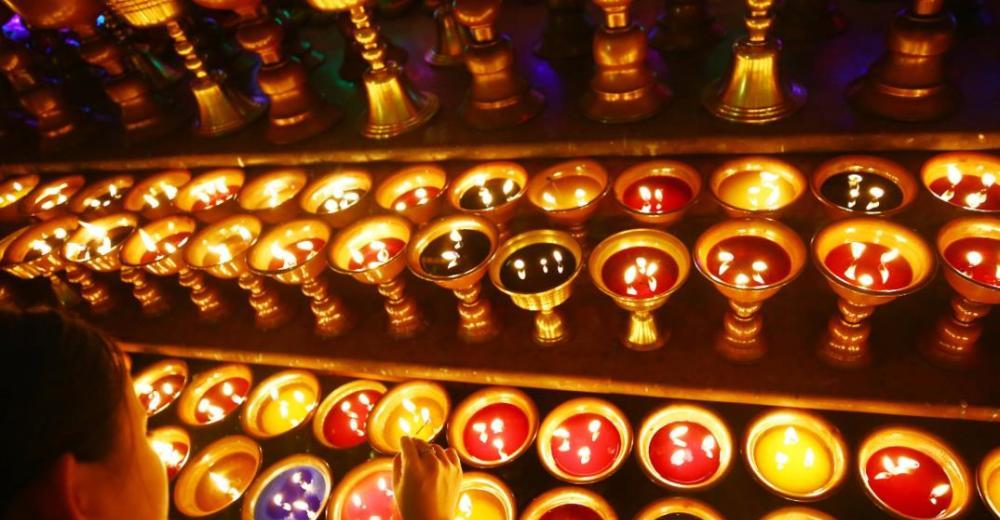Although the Spring Festival has passed, the customs in the folk new month still exist, and the old ancestors' emphasis on the first month will continue until the day when the second dragon looks up in February. Therefore, the atmosphere of the folk Spring Festival will be completely over after February 2.
The upcoming thirteenth day of the first month is also one of the days that the folk ancestors value more. The thirteenth day of the first month, the custom of inheriting the first month, and the wind of the Lantern Festival, can be said to be an important moment of inheriting the past and the future.
In addition, there is a folk saying of "Yang Gong Thirteen Taboos", that is, there are thirteen days every year that are taboo for everything, and the thirteenth day of the first month happens to be among them. Folk ancestors, according to their own life experience, also summed up the custom of "1 point, 2 taboos, 3 do not buy" on the thirteenth day of the first month.

Where "1 point" refers to the lighting stove lamp.
The fifteenth day of the first month was called the Shangyuan Festival in ancient times, whether it was the ancient Shangyuan Festival or the current Lantern Festival, there was a custom of watching the lanterns. On the thirteenth day of the first month, folk will first light the stove lamp in the kitchen.
In ancient times, the king of the stove was regarded as the "head of the family" and was in charge of the blessings and misfortunes in the family, so people would send stoves years ago, pick up stoves Chinese New Year's Eve, and light stove lamps on the first yuan festival. The custom of offering sacrifices to the king of the stove has been and even throughout the entire first month.
The folk "2 taboos" refer to one taboo to go out, and the second to avoid thunder.
The old ancestors believed that the thirteenth day of the first month was not a good time to go out, and even said that the thirteenth day of the first month was taboo to go far. This is because the ancients believed that "thirteen" and "lost" are harmonic sounds, once out of the door, there is the meaning of thirteen, the meaning is not auspicious, so the thirteenth day of the first month is taboo to go out. Another point, due to the existence of Yang Gongji, the thirteenth day of the first month is not appropriate, so in the ancient times when traffic was not developed, going out was a big thing, and naturally it would not choose to be carried out on an unlucky day.
The saying that the thirteenth day of the first month is to avoid thunder is actually derived from a saying of the old ancestors, who called it "the first month of thunder and thunder in the valley", and also said that "the first month of thunder and loess mound". Whether it is an earthen valley pile or a loess pile, it is actually the meaning of more graves. In the eyes of the old ancestors, thunder should not be sounded before the sting, and once there is a sound of thunder, some old people will think that this is a symbol of bad luck.
The "three do not buy" said by the ancestors refers to one does not buy shoes, the second does not buy salt, and the third does not buy tofu.
The reason why the ancestors will not buy shoes in the first month is actually because "shoes" and "evil" are connected, afraid that the family is contaminated with evil, so it is not recommended to buy shoes. The reason why I don't buy salt is because salt is salty. In the first month, people will pray for the prosperity and health of the coming year, but they also know that only their hard work will be exchanged for family prosperity, so they are very taboo against "idleness". Therefore, not buying salt is afraid that it will be "idle" in the new year.
The saying that you don't buy tofu is related to the color of tofu. Folk believe that red represents festivity, so we should hang red lanterns during the Spring Festival, wear red dresses for marriage, and expect the days to be prosperous. Tofu is white, and white is an unlucky color in folk, so even if people want to eat tofu, they will make tofu into frozen tofu or roasted tofu in the waxing moon to eat.
These customs of the ancestors are often the summaries of the life of the old ancestors of the people. In the long production life, the ancestors have summed up a set of folk customs that are exclusive to our land and imprinted with the imprint of traditional culture. Our inheritance of folklore is the promotion of tradition, but also the inheritance of culture!